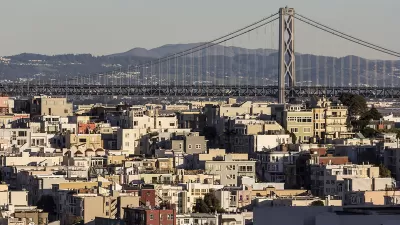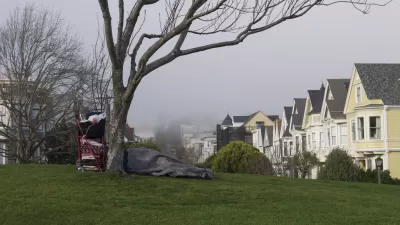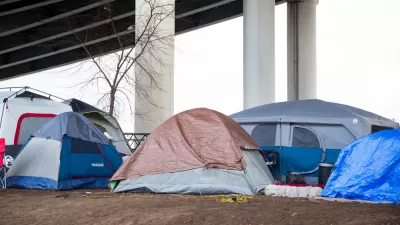A regional measure to tax all property owners in the 9-county Bay Area to adapt to sea level rise passes; S.F. voters support raising the affordable housing bar; Richmond voters reject ballot-box planning; San José approves sales tax increase.

Measure AA, a $12 annual parcel tax for 20 years to raise $500 million for wetland restoration, squeaked by with 69 perecent of the vote. Per the landmark 1978 Proposition 13, it needed to clear the two-thirds threshold. It takes effect next year.
"It’s also one of the first times climate change adaptation has been put before voters," writes Lauren Sommer for KQED Science. It was also the first nine-county measure the metro area voted on.
Sea level could rise 2 feet by midcentury and Measure AA supporters say wetlands are a key strategy in the face of rising water, since they absorb storm surges and protect important infrastructure.
Half of the $25 million raised each year would be given out based on geographic region, while the other half could be allocated to any county. The projects must meet specific goals, like restoring habitat for wildlife, protecting shoreline communities from floods or improving water quality...[T]he first restoration funds [to be] awarded in 2018.
"A dedicated revenue source for the bay has long been a goal of local environmentalists, " writes John King, urban design critic for the San Francisco Chronicle.
Among other benefits, they argue that the widespread restoration of marshes along the northern and southern edges of the bay would help to buffer inland areas from sea-level rise in coming decades, and from the combination of high tides and severe storms.
Affordable Housing in San Francisco
A controversial affording measure in San Francisco, Proposition C, that some, including the respectable San Francisco think tank, SPUR, thought went too far and could backfire, passed with 67 percent of the vote. Since it wasn't a tax measure, it only needed majority vote approval.
"Prop. C returns authority from voters to the Board of Supervisors to change the number of affordable homes — known as inclusionary housing — mandated in residential projects of certain sizes," writes Laura Dudnick, city editor of the San Francisco Examiner.
Legislation that’s put into effect following approval of Prop. C requires projects with at least 25 homes to include 25 percent of those units as below market-rate, including 15 percent for low-income residents and 10 percent for middle-income residents.
The proposition was backed by Supervisor Jane Kim and opposed by Supervisor Scott Wiener, who coincidentally will face each other in the November election to replace state Senator Michael Leno. Both are Democrats, but in California, the 'top two' winners in the primary, regardless of party affiliation, move on to the general election.
Ballot Box Planning in Richmond
Moving to the East Bay, the voters in the Contra Costa County city of Richmond decisively rejected two ballot measures financed by a wealthy developer who wanted his single-family-home development adjacent to a new ferry landing to bypass the city's general plan, which zoned the area for high density housing. Measure N was opposed by over 65 percent of voters, writes Sukey Lewis for KQED News.
Measure O, which would have limited the city manager's salary, thus taking it out of the City Council's hands, was opposed by almost 51 percent of voters.
San José Sales Tax
Proposition 13 does not require that all local tax measures receive two-thirds voter approval. Case in point, Measure B in northern California's largest city, San José, county seat of Santa Clara County.
Because the quarter-cent sales tax "is a 'general' tax, as opposed to being designated for a particular purpose such as funding a BART extension, "which means the City of San José may use the tax revenues for any governmental purpose," per Ballotpedia, e.g., police services, roads, parks, it need only receive majority approval. It passed with 61 percent of the vote.
The tax will last for 15 years and will bring the city about $38 million annually. City residents will pay a total of nine percent sales tax effective September 30. The state caps the sales tax at 9.5 percent as noted in a June 8 post on an upcoming half-cent sales tax measure that will appear on the Santa Clara County ballot on November 8.
FULL STORY: Bay Area Election Roundup: Wetlands, Housing, Ballot-Box Planning, Sales Tax

Alabama: Trump Terminates Settlements for Black Communities Harmed By Raw Sewage
Trump deemed the landmark civil rights agreement “illegal DEI and environmental justice policy.”

Study: Maui’s Plan to Convert Vacation Rentals to Long-Term Housing Could Cause Nearly $1 Billion Economic Loss
The plan would reduce visitor accommodation by 25% resulting in 1,900 jobs lost.

Planetizen Federal Action Tracker
A weekly monitor of how Trump’s orders and actions are impacting planners and planning in America.

Wind Energy on the Rise Despite Federal Policy Reversal
The Trump administration is revoking federal support for renewable energy, but demand for new projects continues unabated.

Passengers Flock to Caltrain After Electrification
The new electric trains are running faster and more reliably, leading to strong ridership growth on the Bay Area rail system.

Texas Churches Rally Behind ‘Yes in God’s Back Yard’ Legislation
Religious leaders want the state to reduce zoning regulations to streamline leasing church-owned land to housing developers.
Urban Design for Planners 1: Software Tools
This six-course series explores essential urban design concepts using open source software and equips planners with the tools they need to participate fully in the urban design process.
Planning for Universal Design
Learn the tools for implementing Universal Design in planning regulations.
Caltrans
Smith Gee Studio
Institute for Housing and Urban Development Studies (IHS)
City of Grandview
Harvard GSD Executive Education
Toledo-Lucas County Plan Commissions
Salt Lake City
NYU Wagner Graduate School of Public Service





























